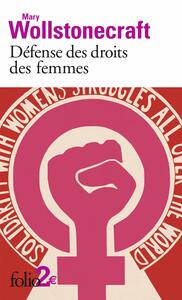Take a photo of a barcode or cover
challenging
informative
reflective
So what if I didn’t read the whole thing, I’m still counting it
If you are writing about women's rights and status, you probably shouldn't keep saying they are weaker than men
I've read bits and pieces of this before (and now understand why I didn't read the rest). I felt like I had an incomplete understanding of the arguments addressing specific culturally significant figures and texts of the time as my knowledge of those works was limited to what Wollstonecraft quoted or referred to in her arguments. Other than that, though, the majority of the text was compelling, and is groundbreaking in a way that is clear even over 200 years later. Minus the refer and rebut section, this is such an essential read.
I'm glad I finally read it in full! I hadn't expected such a religious foundation to her arguments. Compelling and forthright writing.
"The rights and duties of man thus simplified, it seems almost impertinent to attempt to illustrate truths that appear so incontrovertible; yet such deeply rooted prejudices have clouded reason, and such spurious qualities have assumed the name of virtues, that it is necessary to pursue the course of reason as it has been perplexed and involved in error, by various adventitious circumstances, comparing the simple axiom with casual deviations." (From Chapter 1)
It is a mission getting through this essay. It's lengthy, and seems repetitive at some points, but you have to understand where she's coming from. Most of the male population probably needed these points to be repeated over and over and over again before understanding and believing them (hell, some of the male population after 200 years or so STILL doesn't get it).
Nevertheless, it makes many important points that probably helped shaped feminism; about how women who are uneducated are actually a burden on society, the contradiction that women are treated both as (sexual) objects and as children, how women are made fun of for being fragile and ignorant when they aren't allowed to move out of that state -
This work I think is hugely important in understanding the Jane Austen novels. There is no doubt that Austen actually paraphrases Wollstonecraft's arguments at many points throughout her body of work. Not to mention that it actually gives some sort of background to how women were treated a generation before Austen, and it is obvious that some of the problems Wollstonecraft addresses still persist in Austen's novels.
(P.S: I'm not gonna lie, I didn't read the novel.)
It is a mission getting through this essay. It's lengthy, and seems repetitive at some points, but you have to understand where she's coming from. Most of the male population probably needed these points to be repeated over and over and over again before understanding and believing them (hell, some of the male population after 200 years or so STILL doesn't get it).
Nevertheless, it makes many important points that probably helped shaped feminism; about how women who are uneducated are actually a burden on society, the contradiction that women are treated both as (sexual) objects and as children, how women are made fun of for being fragile and ignorant when they aren't allowed to move out of that state -
This work I think is hugely important in understanding the Jane Austen novels. There is no doubt that Austen actually paraphrases Wollstonecraft's arguments at many points throughout her body of work. Not to mention that it actually gives some sort of background to how women were treated a generation before Austen, and it is obvious that some of the problems Wollstonecraft addresses still persist in Austen's novels.
(P.S: I'm not gonna lie, I didn't read the novel.)
I think my brain was about to explode. The whole book was stream of conscience thinking and run-on sentences. It was very difficult to follow at times.
Mary Wollstonecraft’s A Vindication of the Rights of Woman (1792) is a fantastic piece of philosophy, analysis and policy that ventures to allow women to fully engage with the world. Why wasn’t I ever exposed to this? I was lucky to be introduced to so many classics, but women were almost totally absent from my curriculum, especially when it came to philosophy or politics. Wollstonecraft shows that people were writing, talking and thinking about these important issues 222 years ago. She just blew me away with this piece and I highly recommend it to everyone.
Education is at the forefront of her recommendations, noting that women excel at learning, when they are given the same opportunities as their male counterparts. In her introduction, she attributes one cause of the lack of advanced knowledge and cognitive power in women to “a false system of education gathered from the books written on this subject by men, who, considering females rather as women than human creatures, have been more anxious to make them alluring mistresses than rational wives” (p. 11).
Wollstonecraft works to deobjectify and humanize women: “My own sex, I hope, will excuse me, if I treat them like rational creatures, instead of flattering their FASCINATING graces, and viewing them as if they were in a state of perpetual childhood, unable to stand alone. I earnestly wish to point out in what true dignity and human happiness consists–I wish to persuade women to endeavor to acquire strength, both of mind and body, and to convince them, that the soft phrases, susceptibility of heart, delicacy of sentiment, and refinement of taste, are almost synonymous with epithets of weakness, and that those beings who are only the objects of pity and that kind of love, which has been termed its sister, will soon become objects of contempt” (p.13).
She hits the moralists, and this resonates today with calls from the rightwing and evangelicals in the United States: “And will moralists pretend to assert, that this is the condition in which one half of the human race should be encouraged to remain with listless inactivity and stupid acquiescence? Kind instructors! what were we created for? To remain, it may be said, innocent; they mean in a state of childhood” (p. 75).
Let me close with one more quote: “I know that libertines will also exclaim, that woman would be unsexed by acquiring strength of body and mind, and that beauty, soft bewitching beauty! would no longer adorn the daughters of men. I am of a very different opinion for I think, that on the contrary, we should then see dignified beauty, and true grace; to produce which, many powerful physical and moral causes would concur. Not relaxed beauty, it is true, nor the graces of helplessness; but such as appears to make us respect the human body as a majestic pile, fit to receive a noble inhabitant, in the relics of antiquity” (p. 209).
Education is at the forefront of her recommendations, noting that women excel at learning, when they are given the same opportunities as their male counterparts. In her introduction, she attributes one cause of the lack of advanced knowledge and cognitive power in women to “a false system of education gathered from the books written on this subject by men, who, considering females rather as women than human creatures, have been more anxious to make them alluring mistresses than rational wives” (p. 11).
Wollstonecraft works to deobjectify and humanize women: “My own sex, I hope, will excuse me, if I treat them like rational creatures, instead of flattering their FASCINATING graces, and viewing them as if they were in a state of perpetual childhood, unable to stand alone. I earnestly wish to point out in what true dignity and human happiness consists–I wish to persuade women to endeavor to acquire strength, both of mind and body, and to convince them, that the soft phrases, susceptibility of heart, delicacy of sentiment, and refinement of taste, are almost synonymous with epithets of weakness, and that those beings who are only the objects of pity and that kind of love, which has been termed its sister, will soon become objects of contempt” (p.13).
She hits the moralists, and this resonates today with calls from the rightwing and evangelicals in the United States: “And will moralists pretend to assert, that this is the condition in which one half of the human race should be encouraged to remain with listless inactivity and stupid acquiescence? Kind instructors! what were we created for? To remain, it may be said, innocent; they mean in a state of childhood” (p. 75).
Let me close with one more quote: “I know that libertines will also exclaim, that woman would be unsexed by acquiring strength of body and mind, and that beauty, soft bewitching beauty! would no longer adorn the daughters of men. I am of a very different opinion for I think, that on the contrary, we should then see dignified beauty, and true grace; to produce which, many powerful physical and moral causes would concur. Not relaxed beauty, it is true, nor the graces of helplessness; but such as appears to make us respect the human body as a majestic pile, fit to receive a noble inhabitant, in the relics of antiquity” (p. 209).
very intriguing, full of contradictions and unsatisfying statements, but also there's a lot of good stuff in there and given its time it's quite iconic.
also, she's funny! the war with Rousseau in the footnotes made me laugh.
also, she's funny! the war with Rousseau in the footnotes made me laugh.
An enlightening insight into the perspectives of a late 18th Century middle class female thinker. There is much here that could be seen to inspire the generations to come, and to stand up for the authority of reason ahead of tradition. At the same time there is an intriguing tension between many views that might be considered the norm today, and some that feel very much of their era in their affirmation of a stratified perspective of how the sexes relate to each other. What frustrates about the work is that at time digression and embellishment sometimes make it a more difficult read than it could have been. Having said this it is till well worth the effort and provides a great example of how forward thinkers may in the future be judged for the dissonance in their work, rather than recognised for how their ground-breaking ideas formed our world, simply because we already assume and so don't notice much of what they advocate for.



